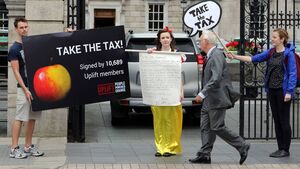Corporation Tax could become a nightmare

A protestor dressed as Snow White demonstrates outside the Dáil in 2016 in support of the EU ruling to take €13 billion in taxes from Apple. Picture: Paul Faith/AFP/Getty Images
Corporation tax is beginning to feel a little like that line from Ulysses about Irish history:
Receipts from the tax have grown over recent years in a way that is impossible to explain. We love that this tax money exists. We spend it wildly. Some don’t want to ask too many questions about why it has grown so enormously. But deep down we worry that we are dancing on a volcano. The receipts from it have been falling recently, but it is still enormous compared to only a few short years ago. The issue hasn’t quite erupted, but there are rumbles.
If not a nightmare, last week something of a bad dream certainly returned, as the Apple tax case came back into view.
It has been hanging around a long time, this one. The issue is this: The European Commission took the view that Apple had underpaid taxes due to Ireland of just over €13 billion between 2003 and 2014, arising from what the Commission claims was special treatment Ireland gave to Apple. Both Apple and Ireland strongly contested that then and continue to do so now. They both argue that Apple paid the right amount of tax and that the company received no special treatment when its tax bill was calculated.
It’s a complicated business, but sufficient to say that the dispute ended up in the Court of Justice of the EU for a decision. That court is divided into two: the lower court, known as the General Court, and the main court, simply known as the Court of Justice (or CJEU).
The lower court heard the case and found in favour of Apple and Ireland, but the European Commission appealed. In a legal opinion related to that appeal, which was issued last week, the higher court of the CJEU was urged to overturn the decision and have the case heard again.
There is a strong chance – though no certainty – that they will follow this advice. More money for lawyers, you might say, and you wouldn’t be wrong. But the issues here are far bigger than that. If the CJEU finds against Ireland, it could be a significant setback to Ireland and Apple's main defence on the key question in the case: that the company did not receive special treatment from Ireland in breach of EU state-aid rules.
The Minister for Finance Michael McGrath was quick out of the blocks.
"It has always been, and remains, Ireland's position that the correct amount of Irish tax was paid and that Ireland provided no State aid to Apple," he said.
It is a hard issue to get your head around in some ways. The position Ireland has taken up feels a little like a scene from . All throughout the legal process, the 1€3 billion has been sitting in an account, waiting for the final judgement of the Court as to what should happen to it. The irony is that if the decision goes in favour of the European Commission and against Ireland, then Ireland will be paid €13 billion. Sounds like an odd way to lose, doesn’t it? We could all do with a shot of bad luck like that, couldn’t we?
And this is why some people can’t understand why the Government is fighting so hard against the case, fighting so hard to make sure Ireland does not get this money. Think, the critics say, just what we could do with the €13. Think of all we could build! All the bills we could pay! All the cost of living increases we could wipe out! We should not contest the case and get the money, they say. Why are we defending some rich technology company, they ask?
Take the money and run – what on earth could be wrong with that line of argument? Well, it is really very simple. If the European Court ultimately finds against Apple and Ireland, it may also mean that there was something illegitimate in how Ireland constructed its Corporation Tax arrangements in this case and that Ireland had done a special deal to benefit one company. And the concern would be that if they find that that is so in this case, perhaps they will find similar fault in others.
And even if there is no such fault, the perception it would create around the world would damage Ireland, for it would send a signal that there is – as the saying goes – something to see here. And this is not a focus that the Government wants. And if you think about it for a minute, is that something any of us would want?
Now it could be years before the final decision in this case is made. If there is a new hearing, it will take a long time before it is concluded. Even if the decision of a new hearing was to overturn the previous decision in favour of Ireland and Apple, it could be appealed to the higher court, the CJEU itself. That could take a very long time. And meanwhile, that €13 billion stays sitting in that account.
The Apple case is about one specific issue, and it will be finalised by the CJEU in due course. But it raises the general area of Corporation Tax and the yield we get from it. We want the money from all this Corporation Tax, and we are mad keen to spend it. However much we like spending it though, many in our society are squeamish about it. There is a general anti-capitalist and anti-profit-making mood around just now, which is hard to square with all the calls to spend this money – which, deep down, many suspect we didn’t actually earn.
Ok, fine, but why talk of a nightmare? That’s a strong word isn’t it? When it comes to Corporation Tax, I’m really not sure.
As the Irish Fiscal Advisory Council has reported, Corporation Tax receipts have more than tripled from €6.9 billion in 2015 to €22.6 billion in 2022. In 2022, just ten corporate groups accounted for three-fifths of all corporation tax receipts. The yield from the tax has started to drop back in recent months, but the truth is no one knows whether that is a blip or a sign of a bigger fall ahead. Whatever about the future, the spending increases of recent years have come out of this massive growth.
What has been happening, right in front of our noses, is that we have been witnessing massive increases in one kind of tax take, linked to significant economic growth yes, but which can’t be fully explained by that growth. These sums flooding into our public coffers have had a major effect on our public debate. Spend, spend more, and spend it now constitutes our public debate day in and day out.
As we discovered after 2008, it is easy to spend money when you have it, and rather more difficult to take it back when you don’t. That experience was a nightmare and one from which this country has not yet fully awoken. Let’s hope we don’t experience another one.





